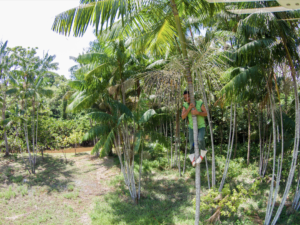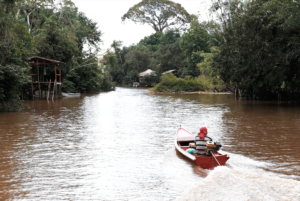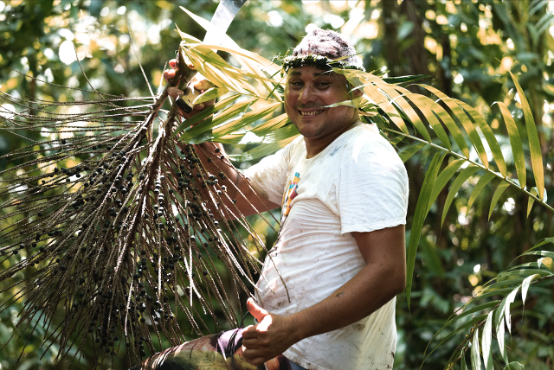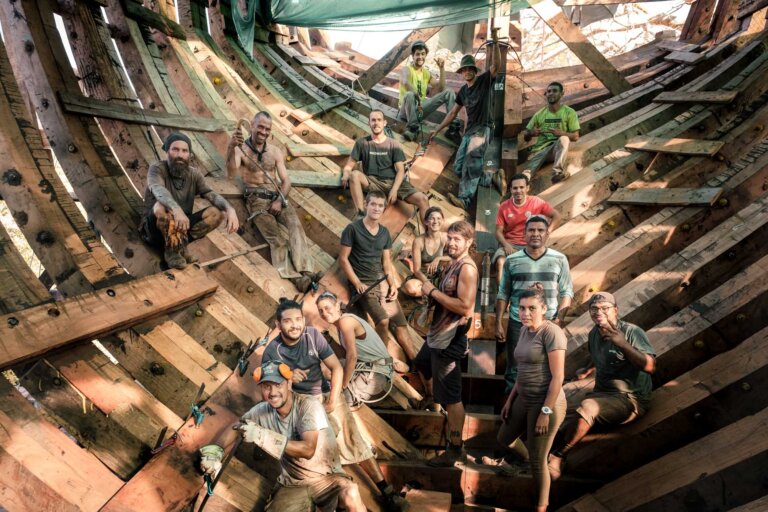Over the past decade, Brazil has become a hub for healthy food exports. The demand for so-called “superfoods” has been growing exponentially. Many countries have been working to increase their presence in this billion dollar industry. Over the past twenty years, Brazil has tactfully jumped on the world’s most popular health-food trends. Brazil’s native foods play an important role in the latest global eating habits. Açaí, a purple berry native to Brazil, is at the center of the country’s “superfood” industry. The berry is often eaten in the form of a frozen pulp and a key ingredient in frozen smoothie bowls. The açaí berry has become increasingly popular, with the market expected to grow from US$720 million in 2019 to US$2 billion by 2025. Brazil is currently the world’s biggest supplier of açaí, producing more than 1.25 million tons of açaí berries per year.
Açaí berries are abundant in the Amazon, turning the rainforest into the most important asset for the Brazilian “superfood” industry. However, there is a general concern that açaí production is done in an unsustainable and unjust way, which is partly due to the fruit’s biology. The açaí berry spoils almost immediately. Within two days of its harvest, the fruit must be frozen so that it is fresh for consumption. This leaves the local workers without any negotiating power. They have to sell the harvest quickly to middlemen, who generally pay little, making it impossible for farmers to harvest their way out of poverty.


![]()
![]() This is where SAMBAZON comes in as the first organic and fair trade certified açaí company in the world. By building their own vertical supply chain, they have created a just and sustainable way to manage the açaí production process.
This is where SAMBAZON comes in as the first organic and fair trade certified açaí company in the world. By building their own vertical supply chain, they have created a just and sustainable way to manage the açaí production process.
After experiencing an açaí bowl for the first time, Ryan Black, Jeremy Black and Edmund Nichols co-founded the açaí company in 2000, based on a triple bottom-line philosophy – livelihoods to the farmers and local communities, protecting the Amazon biodiversity, and a delicious and nutritious açaí berry product to the consumers. They saw the need to change the açaí industry, improve production standards, and give local açaí collectors their fair share. The company has become a successful producer of açaí and is now an established player in the sustainable “superfood” market.
Ryan Black, Jeremy Black, and Edmund Nichols successfully leveraged the strong and sudden demand for açaí, introducing the superfood to the United States. They built their own vertical supply chain that ensures sustainable cultivation and harvest of the açaí while also generating local revenue. The raw material is transformed into a frozen pulp so that it can travel out of the Amazon to the United States, where it is further processed into finished products and ends up in thousands of supermarkets.



SAMBAZON has put the local communities at the center of all its operations, building their products in a participatory manner with the communities who have been living off the land for generations. They actively leverage the local communities and traditional knowledge of the communities living in the Amazon.
At the time, many local communities in the Amazon were engaging in environmentally harmful activities in order to make enough money to feed their families. Most people worked in industrial agriculture and mining, and engaged in unsustainable farming practices. These industries all contribute to deforestation, which leaves some areas in the Amazon more prone to fires that can quickly become uncontrolled. Working conditions are also bad. Most people earn less than the minimum wage of $217 a month, and the polluting industries are detrimental to people’s health. But suddenly, there was this new and highly demanded açaí berry that was growing on palm trees in the Amazon’s floodplains. It became more profitable for local families to harvest these berries than engaging in their previous activities that involved cutting down the trees. In a matter of years, açaí became the main source of commerce turning the fruit into the “Gold of the Amazon”.
“Açaí is our main source of nutrition and labor. We pick it to eat and sell. Get money to pay for our expenses. It’s known as “Amazon Gold.”



SAMBAZON works directly with the collectors, ensuring that communities get their fair share, a stable income, and financial freedom. This partnership has led to higher incomes for families as well as higher employment within the community. Local people are now involved in the entire production process of açaí products.
“Historically, [communities] face a situation where the middlemen…has the boat [and] buys their fruit. [T]hey may come that day; they may not. It’s take it or leave it pricing. By instituting a direct relationship with [communities], it gives them an ability to plan their lives better. And it gives them financial freedom.” – Ryan Black, SAMBAZON Co-founder & CEO
By supporting the construction of healthcare centers, schools, and community centers, SAMBAZON also provides communities with access to basic education and health services. They also launched a Harvester Program that provides clear producer guidelines, technical assistance, and training on sustainable agroforestry. These practices produce more yields and higher quality products without using chemicals and pesticides that damage the environment. Harvesters are also educated on the commercial processes that are necessary to meet the compliance, auditing, and transparency requisites set by the Organic Certification protocols.
Besides bringing benefit to the people, SAMBAZON – which stands for Sustainable Management of the Brazilian Amazon – also promotes biodiversity and environmental protection. The açaí palm trees are grown in the wild, so they do not require the use of chemical fertilizers or pesticides. Açaí has brought economic value to the Amazon’s floodplains, preventing further deforestation for industrial agriculture or cattle grazing, and promoting sustainable management practices in the Amazon.
In order to sustain their environmental standards, SAMBAZON has pioneered modern industrial, social and environmental standards, enlisting experts from academics, NGOs, and FairTrade certification bodies. Thishas allowed them to make a tangible economic impact on thousands of local families. In partnership with EcoCert, they have developed a Fair for Life model whereby the company donates money into a “Fair Trade Fund” for every açaí berry they harvest. To date, the successful Açaí company has donated $1,000,000 to Fair Trade and other self-sponsored projects in Brazil, used to build and renovate schools, employ educators, fund health care initiatives and to promote after-school programs.
SAMBAZON’s business model requires extensive capacity building, solid value chain partnerships and access to community-driven or public financing models. They are doing pioneering work by partnering with the next generation of local community leaders to build impactful supply chain businesses, while protecting and preserving customary practices. Business can combat challenges like poverty, malnutrition, inequality, and deforestation. To promote inclusion of local communities in sustainable ventures and practices, one can follow the example of SAMBAZON, making business work for people, nature, and climate.



